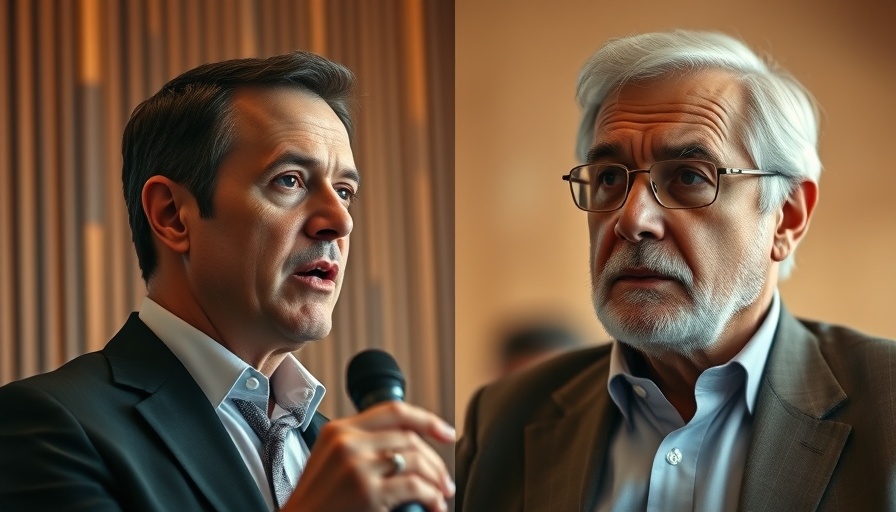
Blockchain Controversy: A Call for Accountability
In a recent exchange on Capitol Hill, Representative Jake Auchincloss stood firm against the Deploying American Blockchain Act of 2025. Although he has historically supported similar legislation, his current stance is rooted in concerns over the potential conflicts of interest stemming from the current Secretary of Commerce’s associations with the cryptocurrency sector, particularly stablecoin Tether. This unfolding scenario raises critical questions about governance, accountability, and the ethics surrounding blockchain technology in America today.
In 'Jake Auchincloss: 'We Cannot Allow This Administration To Continue To Grift Off Of Blockchain', the discussion dives into allegations of conflicts of interest in blockchain governance, prompting a deeper analysis of ethical considerations in U.S. political structures.
The Power of Blockchain: Opportunities and Risks
Blockchain technology has gained notoriety for its potential to revolutionize various industries, providing transparent and secure transactions free from traditional banking constraints. However, as Auchincloss pointed out, the implications of leadership entangled with blockchain interests can substantially undermine trust in regulatory bodies.
The ability of the U.S. government to maintain its position as an impartial referee for cryptocurrencies is pivotal in ensuring a fair market. As blockchain continues to gain traction globally, the potential for abuse—especially incidents of personal gain by those in power—must be critically examined.
Paving the Way for Ethical Practices in Crypto
Auchincloss's concerns exemplify a broader call for transparency and ethical standards in the handling of blockchain initiatives. The need for independent oversight is pressing. If regulators appear to have vested interests, public confidence is shaken, leading to skepticism regarding cryptocurrency’s legitimacy as a medium of exchange or a store of value.
Where Do We Go from Here? Future Predictions
As the country grapples with its approach to blockchain, it remains essential to predict how these decisions will shape the landscape for investors and consumers alike. Well-regulated cryptocurrency markets have the potential to bolster economic activity. However, instability caused by unethical practices can lead to regulatory crackdowns, stifling innovation and pushing potential businesses overseas.
Auchincloss’s vocal opposition to perceived grifts in the current administration calls for citizens to demand greater accountability from those in power. The future could see increased public engagement regarding how blockchain is managed, with citizens advocating for accountability frameworks that ensure transparency.
Understanding Public Sentiment: Engaging the Citizenry
The skepticism surrounding blockchain and cryptocurrency governance is reflective of a larger narrative regarding trust in government systems, making public sentiment on these industries a crucial element to consider. Today, more than ever, Americans are alert to potential conflicts of interests that could jeopardize financial systems. The fact that high-ranking officials might leverage their positions for personal profit could invoke widespread distrust, triggering movements for reform and demanding accountability. Online discussions emphasize the importance of engaging citizens in understanding these developments and advocating for ethical standards.
Actionable Insights: Advocating for Ethical Governance
For individuals seeking transparency within blockchain governance, it’s vital to advocate for establishing clearer laws regarding conflicts of interest in crypto dealings. Public forums and discussions can foster a collaborative environment where citizens voice their concerns, potentially influencing future regulations. Engaging with representatives and participating in community initiatives can galvanize support for legislation ensuring ethical practices across the board in the U.S. government.
The Implications of Ethical Governance on National Stability
Auchincloss's remarks emphasize the importance of maintaining a clean and ethical governance framework, not just within blockchain but also in the broader context of America’s governance structures. A consideration of how blockchain regulations impact areas like job security, fair competition, and economic innovation must be central to future discussions on this topic. The more transparent and accountable the administration can be, the more resilient America’s economy will likely remain, especially as the nation expands its technological frontiers.
 Add Element
Add Element  Add Row
Add Row 



Write A Comment